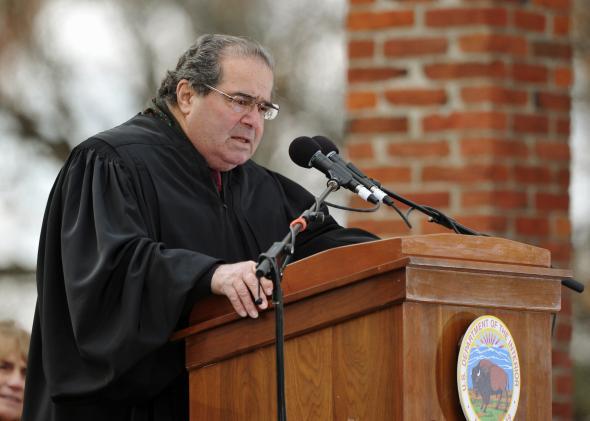Supreme Court Justice Antonin Scalia famously enjoys throwing temper tantrums when he winds up in dissent, predicting a cascade of terrible consequences that will flow from the majority’s ruling. Usually, his prophecies are ridiculously overblown. But when it comes to gay rights, Scalia has a perfect record for anticipating each ruling’s consequences. He swore that Romer would lead to Lawrence, that Lawrence would lead to Windsor—and he was so convinced that Windsor would lead to nationwide same-sex marriage that he penned a draft of what the opinion striking down all gay marriage bans might look like.
Now, for the second time in two months, a federal judge has taken Scalia at his word and struck down state-level anti-gay laws. This time, the unlikely state is Kentucky, and the judge is John G. Heyburn, a George H.W. Bush appointee recommended by Republican Sen. Mitch McConnell. Heyburn’s opinion mostly follows the emerging pattern of these kinds of rulings: He wavers on the scrutiny question, finds that the law was driven by anti-gay animus, and strikes it on Equal Protection grounds. The ruling itself is narrow; Heyburn was only asked to invalidate the portion of Kentucky’s law that bans recognition of out-of-state gay marriages. But the judge added that should the entire ban be challenged, “there is no doubt that Windsor and this court’s analysis” would likely hold it unconstitutional.
By now, an opinion like this is fairly predictable. It comes as a pleasant surprise, then, to see Heyburn channeling his inner Judge Robert Shelby and sticking his thumb directly in Scalia’s eye. In Scalia’s Windsor dissent, the justice decried overly broad, “deliberately transposable passages” expounding the federal Defense of Marriage Act’s unconstitutionality. “How easy it is,” Scalia snorted, “indeed how inevitable, to reach the same conclusion [as the court in Windsor] with regard to state laws denying same-sex couples marital status.” Then he illustrated for the world just how easy it would be to apply Windsor’s logic to state-level gay marriage bans, indignantly substituting a few key words:
DOMAThis state law tells those couples, and all the world, that their otherwise validmarriagesrelationships are unworthy offederalstate recognition. This places same-sex couples in an unstable position of being in a second-tiermarriagerelationship. The differentiation demeans the couple, whose moral and sexual choices the Constitution protects, see Lawrence…
Scalia performs this haughty exercise three times in his dissent, so intent is he to declare to the world I told you so. It’s meant to be a scornful joke—but Heyburn takes it as an invitation to do the same in applying Windsor’s holding to his own state’s law. Toward the end of his opinion, Heyburn steals Scalia’s idea, copying and pasting Justice Anthony Kennedy’s sweeping Windsor opinion and replacing a few key phrases. “As Justice Kennedy would say,” Heyburn writes—cheekily, one has to assume:
By creating two contradictory marriage regimes within the same State, [Kentucky’s laws] force … same-sex couples to live as married for the purpose of [federal law] but unmarried for the purpose of [Kentucky] law. … This places same-sex couples [married out of state] in an unstable position of being in a second-tier marriage [in Kentucky]. The differentiation demeans the couple, whose moral and sexual choices the Constitution protects, see Lawrence …
See the resemblance? Heyburn has beaten Scalia at his own game, nimbly outmaneuvering the justice by using his own clever linguistic twists against him to bring a form of marriage equality to deep-red Kentucky. There’s just one crucial distinction between Scalia’s and Heyburn’s use of these “transposable passages.” Scalia’s version was an exercise in righteousness, an amusing piece of pointed judicial mischief confined to a dissent. And Heyburn’s version just became law.
